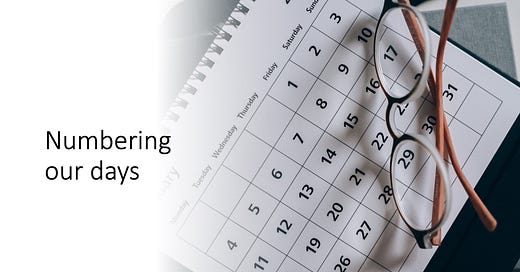Psalm 90 is the only psalm in the entire Psalter associated with Moses. His greatest tragedy was the fact that he was not allowed to enter the Promised Land. In the Book of Deuteronomy, Moses pleads with the Lord: “Please let me go over and see the good land beyond the Jordan” (Deut 3:25). But he gets a negative answer: “you shall not go over this Jordan” (Deut 3:27). The Jewish people sent into the Babylonian exile in 586 BC had similar experience. They could only remember “the good land beyond the Jordan” but were forbidden to enter into it.
Thinking of what we once had and lost due to negligence or lack of care can transform our perception of life. With age comes wisdom but also regrets. Many contemplate a second chance, but life does not offer such a thing. As the Greek philosopher Heraclitus said: “You cannot step into the same river twice”. As we approach the end of our lives, we realise how fleeting it is and that we cannot undo past choices. Unfortunately, this wisdom is hidden from us when we are young. At a young age, we seldom think about death and about the fragility of life that like grass springs at dawn and fades by evening.
The brevity of human life is compared with God’s eternity. He is God “from everlasting to everlasting” who brought forth everything that exists. But the span of human life is at most 120 years (Gen 6:3), and Moses died at such age (see Deut 34:7). Most of us, however, will not reach such age. In the psalmist’s observation, most people live up to 70 or 80 years. But how does such a short span of life compare to God for whom “a thousand years are as yesterday”? It is a mere breath (see Kohelet 1:2). And so the psalmist asks: “Teach us to number our days aright, that we may gain wisdom of heart” (Ps 90:12). But the challenge is how to do that.
There are books and websites dedicated to time management that break into sections a span of life of those who live up to 80 years of age. Accordingly, we seem to spend 26 years sleeping and additional 7 years trying to get to sleep. Then, we spend around 13 years working and 11 years in front of the screen - either watching tv or on social media. Eating takes us around 5 years, holidays 3 years, and exercising 1 and a half years. There are even websites that calculate the average time we spend praying. But, is it what the psalmist has in mind when asking God to “teach us to number our days aright”?
Biological cycle leads us from the dawn of birth to the evening of life and ends up in the sleep of death. But, for us who believe in Christ, life does not end but changes. We hear this proclamation in the liturgy of the Church: “Indeed for your faithful, Lord, life is changed not ended, and, when this earthly dwelling turns to dust, an eternal dwelling is made ready for them in heaven” (The Preface I for the Dead). Christ has reversed the biological cycle by leading us from death to life, from the night of sin to the dawn of grace. This truth is beautifully captured by Saint Therese of Lisieux: “I am not dying; I am entering life”.




